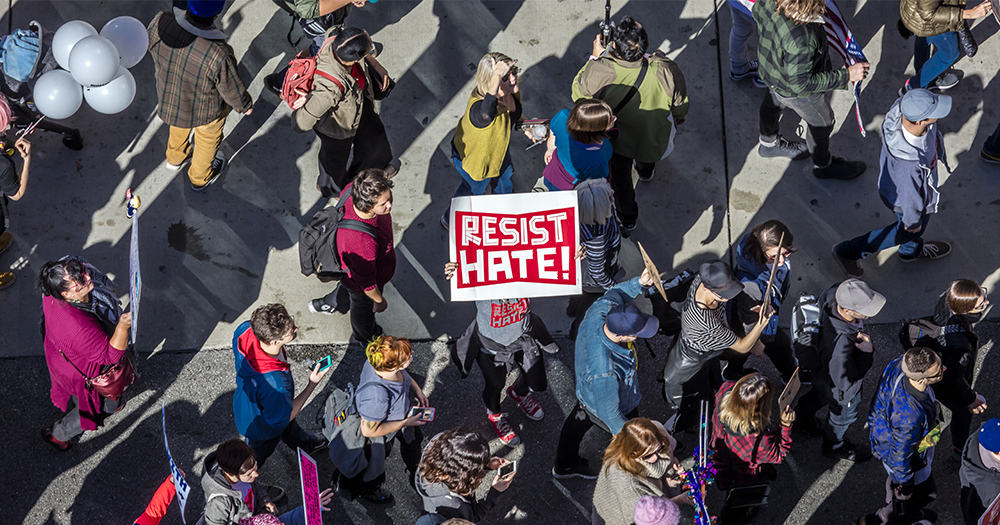For many in Ireland, the success of the Marriage Equality legislation in May 2015 indicated a seismic shift in public opinion towards LGBTQ+ individuals and groups. Within the last decade, however, increases in anti-LGBTQ+ rhetoric and violent attacks across Ireland and Europe suggest that shift is under threat.
New research from the RESIST project documents the rise of organised attacks and threats to LGBTQ+ people and organisations. The research indicates a dangerous inflection point for LGBTQ+ communities in Ireland, adding to reports of LGBTQ+ people being the second most targeted group in the country for hate crimes and hate-related incidents and of the worsening mental health and wellbeing of the community.
The RESIST project is international in scope and the research was carried out in Ireland and across seven European countries – Spain, Belarus, France, Switzerland, Poland, Germany and Greece. It makes for disturbing reading. Participants reported frequent and often increasing experiences of verbal and physical attacks, as well as systemic discrimination and political violence. Among the main targets for this ‘anti-gender’ rhetoric were feminists and LGBTQ+ people, as well as cisgender heterosexual women.
According to Professor Kath Browne, School of Geography, UCD and RESIST project coordinator, “The overriding finding from our research is the significant increases in attacks which are happening both on and offline, with online activity generally a precursor to offline aggression.”
Social media is now routinely expected to be a space where attacks and harassment occur, with much of it organised and targeted by specific accounts. Where previously such abuse was ‘occasionally’ directed at those who are public figures who post on areas such as gender, sexuality, feminism, migration or sex work, they are now daily, personalised, and trained on individuals who simply identify as trans or LGBTQ+. Such attacks, sustained through social media, can morph into new forms.
Additional findings from the RESIST research for Ireland include:
1. In Ireland, there are targeted attacks and threats against LGBTQ+ people
Attacks on individuals ranged from direct physical attacks through to social media ‘pile ons’. Key to the mobilisation of these attacks was the media, often presenting anti-trans and broader anti-LGBTQ+ positions as being from “respectable people” who have “reasonable” concerns.
2. Participants spoke of organisational targeting and intra-community attacks
LGBTQ+ organisations spoke of being subject to sporadic and distressing attacks. Those who perpetrated anti-trans, racist, and anti-immigrant attacks were also to be found within LGBTQ+ communities.
3. For those who are racialised, classed and gendered in Ireland, intersectional attacks and multiple marginalisations shaped their experiences
Racialised participants and participants with migration backgrounds experience attacks on intersecting levels, including anti-immigration and anti-LGBTQ+. Working-class communities are particularly targeted for anti-immigrant and anti-trans mobilisations. Lesbians and lesbian organisations were assumed to be anti-trans and were targeted by individuals and organisations—mainly outside of LGBTQ+ communities—who sought their support. Conversely, those who hold intersecting positions of privilege can feel insulated from attacks.
4. These attacks have been on the increase since the turn of the decade
Personal and organisational attacks experienced by participants have increased significantly and have become targeted at individuals recently. This was unexpected for some; for others, it was a continuation of older forms of discrimination. Participants expected that these attacks would continue to increase in the future.
5. There are ongoing residual effects of being targeted and attacked
People who are targeted suffer because of the ongoing and residual effects of these attacks on their lives. These effects include fear, physical and mental health difficulties, problems at work, and family and relationship pressures.
6. Organisations and their work are detrimentally affected by targeting and attacks
Organisations subject to attack were significantly impacted in terms of their capacity to provide their services to those who need them, and in the effects on staff. Organisational funding has been impacted as funders are targeted as the area they work in becomes ‘controversial’. There is a fear for LGBTQ+ organisations’ survival.
The reported effects of these attacks are significant on physical and mental health, employment, families and relationships. “The research shows the effect of these attacks on people and organisations who were either marginalised or who supported some of the most vulnerable LGBTQIA+ people in Ireland,” Professor Browne commented. “Many reported that they felt more scared, vulnerable and insecure than in past years, with consequences in their everyday lives such as fear, burnout, and anxiety being common.”
As Professor Browne summarises, “Our research indicates organised anti-trans and anti-LGBT attacks on groups and people across Ireland. This might be a surprise for some who believe that over the last decade, Ireland has changed.”
The RESIST project is coordinated by University College Dublin in collaboration with Edinburgh Napier University, European University Viadrina, Université Paris 1 Panthéon-Sorbonne, Lucerne University of Applied Sciences and Arts, Université de Lausanne, Université de Fribourg, Universitat Pompeu Fabra, and Feminist Autonomous Centre for research, Maynooth University. RESIST is a four-year study supported by the research councils and funding bodies of the European Union, UK and Switzerland. More information about the project on its website: https://theresistproject.eu
© 2024 GCN (Gay Community News). All rights reserved.
Support GCN
GCN is a free, vital resource for Ireland’s LGBTQ+ community since 1988.
GCN is a trading name of National LGBT Federation CLG, a registered charity - Charity Number: 20034580.
GCN relies on the generous support of the community and allies to sustain the crucial work that we do. Producing GCN is costly, and, in an industry which has been hugely impacted by rising costs, we need your support to help sustain and grow this vital resource.
Supporting GCN for as little as €1.99 per month will help us continue our work as Ireland’s free, independent LGBTQ+ media.
